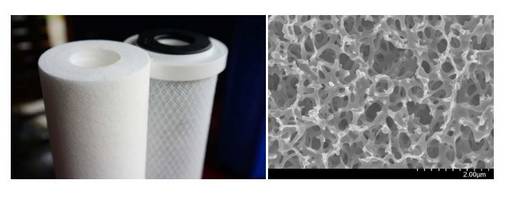PES Increasingly Preferred for Hollow Fibers & Cast-Membrane Filter Media

Engineering thermoplastic provides superior properties for fluid handling in applications ranging from dialysis equipment to water-treatment filters
Phoenix, Ariz., U.S. — The engineering thermoplastic polyethersulfone (PES) is increasingly the choice to produce hollow fibers for fluid transport and cast membranes for filtration applications thanks to its high mechanical, chemical, and thermal properties and a microporous structure that makes PES a very-effective filter medium. Sumitomo Chemical Advanced Technologies offers four grades (4800P, 5200P, 5400P, and 5900P) of PES for the filtration market segment under the tradename SumikaExcel™. Each grade is supplied as a powder1 , which is subsequently dissolved in an organic solvent and either spun into hollow fibers or cast as membranes with very controllable pore size/diameter and distribution, excellent strength and chemical stability, and high porosity and permeability for long use-life, low fouling, and superior separation performance. Such filter media are used in applications as diverse as hollow-fiber dialyzer filter packs for low- and high-flux hemodialysis procedures, particle filtration for wastewater treatment, microfiltration for beverage clarification, ultrafiltration drinking-water decontamination, reverse osmosis for seawater desalination or drinking-water purification, and chemical separators.
-more- 1 Particle size range from 300-500 µm. 3832 E. Watkins Street, Phoenix, AZ 85034 PES Increasingly Preferred for Hollow-Fiber & Cast-Membrane Filtration Media 2-2-2-2
PES is an amber-transparent, amorphous engineering thermoplastic known for its high mechanical properties, including high strength and impact resistance, low creep even at elevated temperatures and loads, low warpage (owing to the complete absence of crystallization), high dimensional stability, and low coefficient of linear thermal expansion (CLTE) over a broad temperature range. The polymer also provides superior stress-crack and good and broad chemical resistance2 (particularly for an amorphous thermoplastic). It also offers excellent thermal stability, including long-term heat aging and performance at elevated temperatures3 . Filtration applications are enhanced by the microporous structure that can be created in either hollow tubes or cast membranes. (Although not critical in this market, PES also has inherent flame retardance4 , low smoke, and minimal outgasing.) Combined, these attributes enable PES hollow fibers and cast membranes to withstand high-pressure cleaning processes like gas backwashing, as well as super-heated steam, e-beam radiation and ethylene-oxide sterilization, and exposure to sodium hydroxide, sodium hypochlorite, and surfactants. That, in turn, helps ensure high flow, long use-life, and low fouling in critical filtration media.
Sumitomo Chemical is unique in the plastics industry as the world’s sole PES manufacturer that maintains dedicated PES polymerization facilities (in Chiba and Ehime, Japan). This eliminates the possibility of cross-contamination with other polymers and also simplifies the supply chain for processors and OEMs.
PES polymer is offered pelletized for injection molding, extrusion, and film processes and in powder form for cast films, filtration membranes, and as an epoxy additive for composites, hightemperature paints and coatings, and adhesives. PES grades are used in the aerospace, automotive, electrical/electronics, medical-device, and food-handling industries.
Sumitomo Chemical Advanced Technologies LLC, formerly called Sumika Electronic Materials and a wholly owned subsidiary of Sumitomo Chemical Co., Ltd., is a leading manufacturer of polyethersulfone (PES), liquid crystal polymer (LCP), and high-performance alloy resins. The company serves as the U.S. base of operations and customer support for Sumitomo Chemical’s photoresist and engineering plastics businesses and is certified to ISO9001:2008 and ISO14001:2004 standards. For more information, see www.sumikamaterials.com/ or call +1.602.659.2500.
Phoenix, Ariz., U.S. — The engineering thermoplastic polyethersulfone (PES) is increasingly the choice to produce hollow fibers for fluid transport in applications like dialyzer filter packs for lowand high-flux hemodialysis procedures. The material offers very controllable pore size/diameter and distribution, excellent thermal, mechanical, and chemical stability, and high porosity and permeability for long use-life, low fouling, and superior separation performance. In fact, the microporous structure of the hollow fibers (top at 100-µm and bottom at 20-µm magnification) help enhance dialyzer filter-pack performance. Sumitomo Chemical Advanced Technologies offers four grades of PES for the filtration market segment under the tradename SumikaExcel™.
Phoenix, Ariz., U.S. — Thanks to high mechanical, chemical and thermal properties and the microporous structure that can be obtained (shown above right at 2-µm magnification), polyethersulfone (PES) is increasingly the choice to produce cast membranes for particle filtration in wastewater treatment, microfiltration for beverage clarification, ultrafiltration drinking-water decontamination, reverse osmosis for seawater desalination or drinking-water purification, and chemical separators. PES filtration media can withstand high-pressure cleaning processes like gas backwashing, as well as super-heated steam, e-beam radiation and ethylene oxide sterilization, and exposure to sodium hydroxide, sodium hypochlorite, and surfactants, which, in turn, help ensure high flow, long use-life, and low fouling in critical filtration media. For the filtration market segment, Sumitomo Chemical Advanced Technologies offers four grades (4800P, 5200P, 5400P, and 5900P) under the tradename SumikaExcel™.
Contact: Peggy Malnati, Malnati & Associates LLC, +1.248.592.0765, peggy@malnatiandassociates.com




